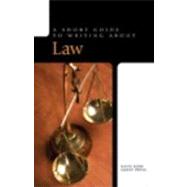
Note: Supplemental materials are not guaranteed with Rental or Used book purchases.
Purchase Benefits
What is included with this book?
1. Writing about the Law
WHY WRITE ABOUT THE LAW?
THE UNITED STATES LEGAL SYSTEM
RHETORIC AND THE LAW
Lawyers as Rhetoricians: The Sophists
Genres of Oratory
Rhetorical Analysis: The Rhetorical Triangle
Rhetorical Analysis: Rhetorical Appeals
Making a Valid Argument: Syllogisms and Fallacies
WRITING A FORMAL RHETORICAL ANALYSIS
What Is the Context?
Who is Talking?
Are the Arguments Valid?
Are You Moved?
Rhetorical Analysis Checklist
2. Reading and writing Case Briefs
WHAT IS A CASE BRIEF?
Case Name and Citation
Issue
Facts
Holding
Reasoning
Dissenting and Concurring Opinions
LEGAL ARGUMENTS: TOPOI
Precedent
Legislation
History
International or Comparative Law
Morality
Public Policy
Science
FORMATTING A CASE BRIEF
Case Brief Checklist
3. Frameworks for Legal Scholarship
CLASSICAL FRAMEWORK
Introduction: Exordium.
Background Information: Narration
Manageable Parts: Partition
Supporting Arguments: Confirmation
Possible Objections: Refutation
Conclusion and Course of Action: Peroration
C-RAC FRAMEWORK
Conclusion
Rule
Application
Conclusion
SCHOLARLY FRAMEWORK
Thesis
Supporting Arguments
Evidence
Counterarguments and Rebuttals
Conclusion
CREATING AND SUPPORTING A THESIS
Creating a Thesis
Supporting a Thesis
DISCOVERING EVIDENCE
Primary v. Secondary Sources
Scholarly v. Non-Scholarly Sources
COUNTERARGUMENTS AND REBUTTALS
WRITING AN ARGUMENT OUTLINE
Step One: Supporting Arguments
Step Two: Evidence
Step Three: Arrangement and Transitions
Argument Outline Checklist
4. Doing Legal Research
PRINCIPLES OF LEGAL RESEARCH
The Citation Trail
Precision
ONLINE LEGAL RESEARCH TOOLS
LexisNexis Academic
HeinOnline
Oyez and Justia
Findlaw.com
Library of Congress Law Library
Cornell University Legal Information Institute (LII)
Wikipedia
State Courts Sites
Government Printing Office (GPO)
6. Using Sources
RHETORICAL PURPOSES OF CITATION
Gain Authority
Give Credit
Research Trail
BASIC CITATION FRAMEWORK
Three Parts: Signal, In-text Marker, Reference Entry
Legal Sources in MLA
INTEGRATING SOURCES
Who's Talking?
Signal Words
Sample Student Paragraph
CITING PRIMARY LEGAL DOCUMENTS
Court Opinions and other Documents
Legislative Materials
International Laws
Foreign Laws
Executive Materials
Treaties
Try it: Researching and Citing Legal Sources
6. Writing Effective Paragraphs
INTRODUCTORY PARAGRAPH
Hook
Context
Thesis
Methodology
Assess a Student's Introduction
BACKGROUND PARAGRAPHS
Assess a Student's Background Paragraph
ISSUE PARAGRAPHS
Topic Sentence
Support from source
Summarize/Interpret/Apply (SIA)
Transition
Assess a Student's Issue Paragraph
CONCLUSION PARAGRAPHS
ANALYZE AN INTRODUCTION
7. Peer Workshops and Revision
QUIRKS OF LEGAL DISCOURSE
Paired Synonyms
Prepositional Phrases
Nominalized and Passive Verbs
"Precedent"
Introducing a Case
TIPS FOR STRONG SCHOLARLY WRITING
Topic Sentences & Signposts
“Clearly"
Editorial Hyperbole
Clichés
Formatting Problems
REVISION
Start Early
Create Fresh Eyes
Use a Revision Checklist
Revision Checklist
Get Help from a Friend
PEER WORKSHOPS
Keep Time
Read Out Loud
Give Praise and Criticism
Specificity
EDITORIAL ABBREVIATIONS
Workshop Checklist
8. Sharing Your Research
ORAL PRESENTATIONS
Think About Rhetoric
Organization
Presentation Software
Tips
PUBLISHING YOUR RESEARCH
Research the Journals
Write an Abstract
Write a Cover Letter
Submitting to a Journal via Email
The New copy of this book will include any supplemental materials advertised. Please check the title of the book to determine if it should include any access cards, study guides, lab manuals, CDs, etc.
The Used, Rental and eBook copies of this book are not guaranteed to include any supplemental materials. Typically, only the book itself is included. This is true even if the title states it includes any access cards, study guides, lab manuals, CDs, etc.